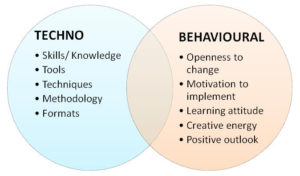Ram & Shyam
Typical behavioural training
My name is Ram. I am excited today.
I am invited to attend the training on time management. “I could have asked something different today, like the KBC hot seat. Since morning I was thinking of how to take up 30 jobs in 1 hour when everybody wants it to be done now?”
Another reason for this excitement: it is my first training after getting the job.
Everybody was supposed to reach the classroom by 9.00 am, half hour before the start of the programme. I reached a little earlier than the scheduled time.“The classroom that used to be the most dreadful place in college today seems so blissful.”
The lecture began. The faculty was very knowledgeable. All aspects of time & the way to manage these were covered. All of us are attentive. Before I could realise, the attentiveness gave way to meditation. I realised it when suddenly a gush of movement broke my trance.
I glanced around, everybody was attentive. Still I could identify two of my friends from purchase dozing to the blissful trance that I had just experienced.
Suddenly, the faculty threw a pointed question, what is the priority, an important activity or, urgent activity. Two hands went up and an explanation was given by my collegue. I felt like I was saved by him.
Soon it was time for lunch. The agonising meal at the canteen today looked yummy. The break was welcome.
We were all in time for the afternoon session. This time I decided to concentrate. When I did, I started to enjoy. We even had a group discussion.
After tea time, my room mate, who was all too attentive so far of the day; dozed off on my shoulder. The faculty did notice it. I shrugged my shoulders, as if to remove this blame form my being. Room mate came back to senses. He wiped off his glasses and looked at the white board.
The time management matrix was finally complete. It was time to go. Just at this point, the faculty asked, what are you going to implement from tomorrow.
I went through the motion of scribbling something on my pad, to ward off embarrassment.
I looked at my room mate. He pointed at his scribble. We both smiled our way out of the classroom.

Typical technical (subject) training
I am Shyam. I have attended so many trainings. Still, I am very excited to receive the training circular.
We will go through a team building session today.
I liked such trainings. My mind always awakened to new insights during such training sessions. Faculty for the programme is known to me. He is not only knowledgeable, but also keeps the participants involved. I had thoroughly enjoyed his earlier sessions. That is why when the circular mentioned his name, I ensured my participation.
Training started in a very friendly atmosphere. All of us were of the same age group, but for three people (senior in age but similar in responsibility). The programme was running at a high pace. I am feeling the excitement all around. Even the three senior people participated like a bonfire. “How different they are in the class room!”
3 breaks & 4 exercises later, the programme came to an end. Ah! “Such a programme must be of higher duration” I wrote in my feedback.
It was time to go. Just at this point, the faculty asked, what are you going to implement from tomorrow.
I had great feelings. I will win over the world tomorrow. But the faculty was asking for writing actions. I went through the motion of scribbling something on my pad, to ward off embarrassment.
I looked at my left. He pointed at his scribble. We both smiled our way out of the classroom.
 Ram & Shyam is a typical story of subject focused (technical) & attitudinal (behaviour focussed) trainings.
Ram & Shyam is a typical story of subject focused (technical) & attitudinal (behaviour focussed) trainings.
The faculty is great. The subject is great. The process is great. The participants are great.
And the outcome?
At in_cr_ove, we tried to fathom the reason.
Here is our interpretation of Ram & Shyam syndrome.
Typical behavioural training motivates participants to a very high order. The emotions run high. Enderlin is pumped up. The feeling while leaving the classroom is ecstatic. And the next day, the people do not know what to do with this new found energy.
Rest of the people in the department have not attended the training yesterday. I am the odd man out. Slowly, I get accustomed to the group & the training is forgotten. But the memories of the programme remain as sweet as ever.
Typical technical (subject) training is knowledge & skill oriented. Since, training is the condensed form of learning, subject coverage is of paramount importance. In this story, the time management concepts were understood though not in great details.
The problem comes up the next day when the boss suddenly calls up and after waiting for half hour, the recently learned person is handed over 3 urgent jobs to be done in next 2 hours. He is perplexed. As if this was not enough, his colleagues come over for a tea chat & another 30 minutes are gone.
The fighter gets his old fangs out and gets on with the fire job. The learning is forgotten by the next three repeat cycles of similar episodes.
Techno-behavioural training
 What is in_cr_ove solution to Ram & Shyam syndrome?
What is in_cr_ove solution to Ram & Shyam syndrome?
in_cr_ove learning sessions are techno-behavioural in composition.
Whereby the knowledge & skill is imparted with the solutions to go through the implementation roadblocks (in the majority of cases these are behavioural). The “360 degrees view” gives a better understanding with aid & barrier analysis.
Most of in_cr_ove techno-behavioural training sessions end with a realistic tool in the hands of the participants.
This methodology ensures that the participants leave the classroom with a skill and/ or, knowledge in the form of a realistic tool and with the inspiration to try it in the work/ family/ social surroundings.
in_cr_ove experience with techno-behavioural training is that of longer learning retention & positive outcomes. We find it an effective way to overcome the negatives of Ram & Shyam syndrome.


